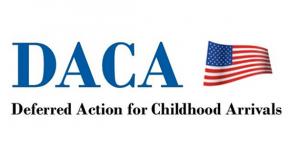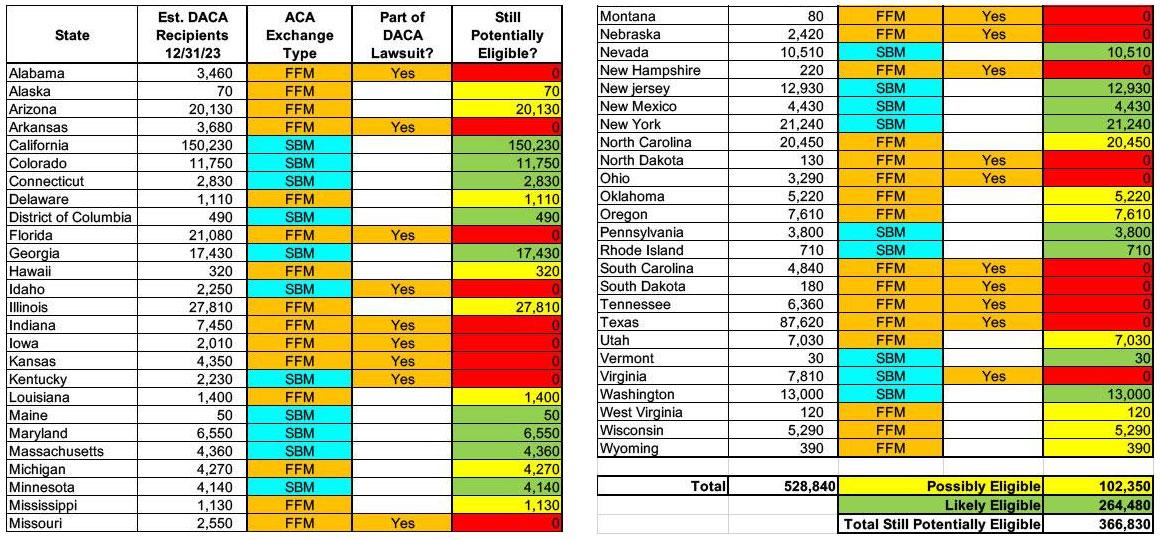Update: 8th Circuit Court issues stay of injunction; DACA recipients can enroll in ACA coverage nationally after all (for now)!

Originally posted 12/09/24
SEE UPDATE AT BOTTOM
The Deferred Action for Childhood Arrivals (DACA) program was created to protect eligible young adults who were brought to the U.S. as children from deportation and to provide them with work authorization for temporary, renewable periods. As of December 31, 2022, there were roughly 580,000 active DACA recipients from close to 200 different countries of birth residing all over the U.S.
While individuals with DACA status can be authorized to work, they remain ineligible for many federal programs, including health coverage through Medicaid, the Children’s Health Insurance Program (CHIP), and the Affordable Care Act (ACA) health insurance Marketplaces. These restrictions result in higher uninsured rates among DACA recipients, contributing to barriers accessing health care.
On April 26, 2023, the Biden Administration published a proposed rule to expand eligibility for health coverage to DACA recipients. Such an eligibility expansion would likely reduce uninsured rates among DACA recipients and, in turn, facilitate access to care and enhance financial protections from medical costs. The future of the DACA program remains uncertain with it subject to pending court rulings.
Today, the U.S. Department of Health and Human Services, through the Centers for Medicare & Medicaid Services (CMS), is publishing a final rule to modify the definition of “lawfully present” applicable to eligibility for enrollment in a Qualified Health Plan (QHP) through the Health Insurance Marketplace and a Basic Health Program (BHP). With this modification, DACA recipients will no longer be excluded from that definition, thereby making it possible, effective November 1, 2024, for DACA recipients who meet all other eligibility requirements to enroll in:
(1) a QHP through the Marketplace with financial assistance like Advance payments of the premium tax credit (APTC) and cost-sharing reductions (CSRs) or
(2) a BHP.
These changes support the Affordable Care Act (ACA)’s goals of increasing access to health insurance and improving the health and well-being of people by providing access to affordable, quality health coverage for many uninsured DACA recipients. CMS estimates that this rule could lead to 100,000 previously uninsured DACA recipients newly enrolling in health coverage through a Marketplace plan or a BHP.
Under this rule, DACA recipients will be treated the same as other individuals granted deferred action for purposes of eligibility for coverage through a Marketplace plan or a BHP. In addition, CMS made some technical modifications to the definition of “lawfully present” used to determine eligibility for these programs to create administrative efficiencies, streamline verification processes, and promote clarity and transparency. The rule’s technical changes to the definition of “lawfully present” will benefit consumers by enabling CMS and states to administer their programs more efficiently for eligible noncitizens and to ensure complete, accurate, and consistent eligibility determinations and verification processes for health coverage for these populations.
After a review of comments from the public regarding the rule’s effective date, CMS has finalized November 1, 2024, as the effective date for all provisions in the rule in order to align with the individual market Open Enrollment Period in most states and allow time for required operational updates. Starting November 1, 2024, DACA recipients will be considered lawfully present for Marketplace and BHP coverage and, if they meet all other eligibility requirements, will be eligible to enroll in a QHP through the Marketplace with financial assistance such as APTC and CSRs or a BHP.
As I noted at the time:
There's roughly 580,000 immigrants who have DACA status as of today. While all of them would presumably become eligible for ACA enrollment (and, therefore, federal ACA subsidies) via the change in their residency status, that doesn't mean 580K new ACA exchange enrollees. According to the Kaiser Family Foundation, around 39% of them are currently uninsured, or roughly ~230,000, give or take. The rest have other types of healthcare coverage just like most other Americans do.
Even among those ~230K, not all of them will necessarily qualify for financial subsidies as some may have too high an income, although I suspect that number will be minimal among this population. And of course some of them will become eligible for Medicaid instead. On the other hand, some of the other ~350K DACA recipients who are currently categorized as "insured" may have terrible coverage via short-term or other types of "junk" plans and thus may become eligible for ACA/Medicaid coverage as well.
The New York Times boiled it down further yet at the time:
U.S. officials estimate that about 100,000 uninsured people could obtain health insurance as a result.
Cut to The Hill earlier this evening:
A federal court in North Dakota has blocked Affordable Care Act (ACA) coverage for immigrants that came into the U.S. illegally as children, also known as “Dreamers.”
U.S. District Judge Daniel M. Traynor on Monday granted Kansas, alongside 18 other states, a stay regarding a final rule from the Biden administration allowing some Dreamers access to the ACA marketplace, according to court documents. He also granted Kansas and the other states a preliminary injunction barring the federal government “enforcing the Final Rule against” them.
As you probably expected, Judge Traynor is a Republican appointed to his position by Donald Trump. The state Attorneys General who brought the case are from AL, AR, FL, ID, IN, IA, FL, KS, MO, MT, NE, NH, ND, OH, SC, SD, TN, TX & VA. All are Republicans.
This ruling isn't particularly surprising, but it's pretty disappointing.
UPDATE: According to Ben D’Avanzo of the National Immigration Law Center, "The preliminary injunction covers the 19 states that challenged the Biden administration’s Final Rule."
According to the ruling itself, there's just over 162,000 DACA recipieints in those 19 states, or around 28% of all DACA recipients nationally.
In other words, technically speaking, yesterday's ruling only applies to the 19 states which brought the lawsuit, not the entire U.S., so in theory the remaining DACA recipients in the other 31 states (+DC) should still be eligible to enroll in ACA plans.
HOWEVER, this could be technically problematic for HealthCare.Gov, which hosts ACA enrollment for 14 of the other 31 states, although the remaining 17 (which operate their own state-based ACA exchanges) should (again, in theory) be able to continue processing DACA enrollees.
In addition, with Donald Trump about to take over the executive branch again and promising to deport tens of millions of people, I have to imagine getting DACA recipients to enroll in the 14 HealthCare.Gov states which weren't part of the lawsuit could be a tough sell even if HC.gov is able to do so.
UPDATE 12/17/24: Via HealthCare.Gov itself:
Court decision on Deferred Action for Childhood Arrivals
On December 16, 2024, the United States Court of Appeals for the Eighth Circuit issued a temporary stay of the preliminary injunction in Kansas v. United States of America (Case No. 1:24-cv-00150). As a result of this stay, Deferred Action for Childhood Arrivals (DACA) recipients are permitted to enroll in a qualified health plan (QHP) through the Health Insurance Marketplace® in all states, including the 19 states that are involved in the lawsuit. If a future court decision impacts your Marketplace coverage, the Marketplace will send you a notice. This is a preliminary court decision and final decisions could affect your eligibility for coverage. Check back for updates before January 15 when Marketplace Open Enrollment ends.
Again, my guess is many DACA recipients would be reluctant to take advantage of the Biden Administration eligibility rule with or without this lawsuit looming over their heads given the outcome of the election in November, but this is still welcome news for up to 162,000 more people (see below).
In any event, here's a table breaking out the estimated number of DACA recipients in each state and how many are potentially still eligible to enroll (this doesn't break them out by how many are uninsured or not):
Update 12/19/24: As noted by Julie Appleby of the Washington Post, the Biden Administration noted in their latest filing that around 2,700 DACA recipients have already enrolled for 2025 coverage via the federal ACA exchange (Healthcare.Gov) so far, plus an unknown number across the 20 states operating their own ACA exchanges. Allowing the injunction to proceed would require the federal government to cancel all of those enrollments as well as costly coding updates to be able to distinguish DACA recipients in some states vs. others.
There's no specifics re. how many DACA recipients have enrolled in the 20 states operating their own exchanges, but slightly over half (around 277,000 of the 529,000 total) live in those states, so I'd guess at least another 2,700 have enrolled in those states as well...and honestly, my guess is it's higher than that, since most of the state-based exchanges have "immigrant-friendly" administrations.
For instance, CoveredCA has posted a video explainer for DACA recipients encouraging them to sign up. 150,000 DACA recipients--over 28% of the total--live in California.
In other words, the odds are that a bare minimum of ~5,400 DACA recipients have already signed up, and it could potentially be 10,000 or more.




